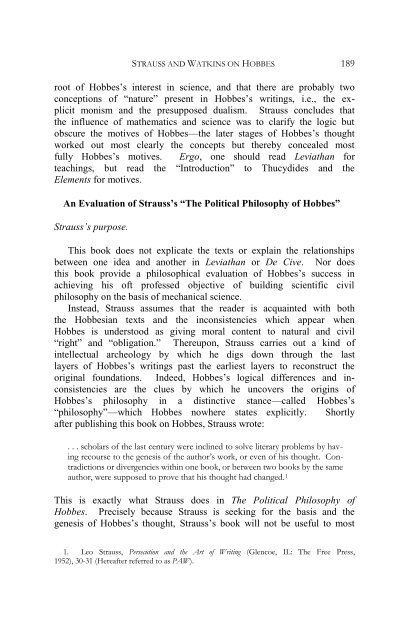Strauss and Watkins on Hobbes' Political Philosophy: A Review
Strauss and Watkins on Hobbes' Political Philosophy: A Review
Strauss and Watkins on Hobbes' Political Philosophy: A Review
Create successful ePaper yourself
Turn your PDF publications into a flip-book with our unique Google optimized e-Paper software.
STRAUSS AND WATKINS ON HOBBES 189<br />
root of Hobbes’s interest in science, <str<strong>on</strong>g>and</str<strong>on</strong>g> that there are probably two<br />
c<strong>on</strong>cepti<strong>on</strong>s of “nature” present in Hobbes’s writings, i.e., the ex-<br />
plicit m<strong>on</strong>ism <str<strong>on</strong>g>and</str<strong>on</strong>g> the presupposed dualism. <str<strong>on</strong>g>Strauss</str<strong>on</strong>g> c<strong>on</strong>cludes that<br />
the influence of mathematics <str<strong>on</strong>g>and</str<strong>on</strong>g> science was to clarify the logic but<br />
obscure the motives of Hobbes—the later stages of Hobbes’s thought<br />
worked out most clearly the c<strong>on</strong>cepts but thereby c<strong>on</strong>cealed most<br />
fully Hobbes’s motives. Ergo, <strong>on</strong>e should read Leviathan for<br />
teachings, but read the “Introducti<strong>on</strong>” to Thucydides <str<strong>on</strong>g>and</str<strong>on</strong>g> the<br />
Elements for motives.<br />
An Evaluati<strong>on</strong> of <str<strong>on</strong>g>Strauss</str<strong>on</strong>g>’s “The <strong>Political</strong> <strong>Philosophy</strong> of Hobbes”<br />
<str<strong>on</strong>g>Strauss</str<strong>on</strong>g>’s purpose.<br />
This book does not explicate the texts or explain the relati<strong>on</strong>ships<br />
between <strong>on</strong>e idea <str<strong>on</strong>g>and</str<strong>on</strong>g> another in Leviathan or De Cive. Nor does<br />
this book provide a philosophical evaluati<strong>on</strong> of Hobbes’s success in<br />
achieving his oft professed objective of building scientific civil<br />
philosophy <strong>on</strong> the basis of mechanical science.<br />
Instead, <str<strong>on</strong>g>Strauss</str<strong>on</strong>g> assumes that the reader is acquainted with both<br />
the Hobbesian texts <str<strong>on</strong>g>and</str<strong>on</strong>g> the inc<strong>on</strong>sistencies which appear when<br />
Hobbes is understood as giving moral c<strong>on</strong>tent to natural <str<strong>on</strong>g>and</str<strong>on</strong>g> civil<br />
“right” <str<strong>on</strong>g>and</str<strong>on</strong>g> “obligati<strong>on</strong>.” Thereup<strong>on</strong>, <str<strong>on</strong>g>Strauss</str<strong>on</strong>g> carries out a kind of<br />
intellectual archeology by which he digs down through the last<br />
layers of Hobbes’s writings past the earliest layers to rec<strong>on</strong>struct the<br />
original foundati<strong>on</strong>s. Indeed, Hobbes’s logical differences <str<strong>on</strong>g>and</str<strong>on</strong>g> in-<br />
c<strong>on</strong>sistencies are the clues by which he uncovers the origins of<br />
Hobbes’s philosophy in a distinctive stance—called Hobbes’s<br />
“philosophy”—which Hobbes nowhere states explicitly. Shortly<br />
after publishing this book <strong>on</strong> Hobbes, <str<strong>on</strong>g>Strauss</str<strong>on</strong>g> wrote:<br />
. . . scholars of the last century were inclined to solve literary problems by hav-<br />
ing recourse to the genesis of the author’s work, or even of his thought. C<strong>on</strong>-<br />
tradicti<strong>on</strong>s or divergencies within <strong>on</strong>e book, or between two books by the same<br />
author, were supposed to prove that his thought had changed. 1<br />
This is exactly what <str<strong>on</strong>g>Strauss</str<strong>on</strong>g> does in The <strong>Political</strong> <strong>Philosophy</strong> of<br />
Hobbes. Precisely because <str<strong>on</strong>g>Strauss</str<strong>on</strong>g> is seeking for the basis <str<strong>on</strong>g>and</str<strong>on</strong>g> the<br />
genesis of Hobbes’s thought, <str<strong>on</strong>g>Strauss</str<strong>on</strong>g>’s book will not be useful to most<br />
1. Leo <str<strong>on</strong>g>Strauss</str<strong>on</strong>g>, Persecuti<strong>on</strong> <str<strong>on</strong>g>and</str<strong>on</strong>g> the Art of Writing (Glencoe, IL: The Free Press,<br />
1952), 30-31 (Hereafter referred to as PAW).
















